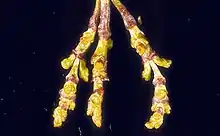Arceuthobium campylopodum
Arceuthobium campylopodum is a species of dwarf mistletoe known as western dwarf mistletoe. It is native to the low to moderate elevation coniferous forests of western North America. It is a common parasite of several species of pine tree, including Jeffrey Pine, Ponderosa Pine, and Coulter Pine. The dwarf mistletoe is a greenish-yellow structure above the bark of the tree, while most of the plant is beneath the bark. Seeds mature during the fall and disperse to nearby trees.
| Arceuthobium campylopodum | |
|---|---|
 | |
| Scientific classification | |
| Kingdom: | Plantae |
| Clade: | Tracheophytes |
| Clade: | Angiosperms |
| Clade: | Eudicots |
| Order: | Santalales |
| Family: | Santalaceae |
| Genus: | Arceuthobium |
| Species: | A. campylopodum |
| Binomial name | |
| Arceuthobium campylopodum | |
Uses
Some Plateau Indian tribes used western dwarf mistletoe as a wash to prevent dandruff.[1]
References
- Hunn, Eugene S. (1990). Nch'i-Wana, "The Big River": Mid-Columbia Indians and Their Land. University of Washington Press. p. 351. ISBN 0-295-97119-3.
This article is issued from Wikipedia. The text is licensed under Creative Commons - Attribution - Sharealike. Additional terms may apply for the media files.